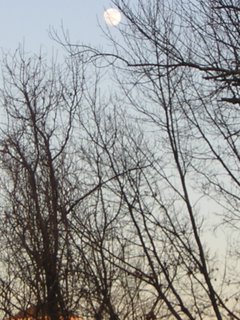Modern Marvels
 This carpet moss (Mnium hornum) is living on the moist ground at the edge of my yard, the mosses are an incredibly persistent life form. They are rootless organisms - having only a single celled rhyzoid to embrace the earth and absorb water - yet they are formed to place, not made to move, but to flourish. Their vitality comes from a resilience of marvellous proportions. Mosses can rebound from near desiccation and flourish anew. Mosses are the primary land plant. Their story is astounding, when you think of it. Some 500 million years ago, this gaggle of cooperating cells, this self-replicating system, found a way to flourish where water had evaporated. (Life has that persistence.) How many tries before it got it right? Enough to get it right, if Darwin and Mendel are correct. These relics flourish now in my yard, glowing green, alive in honest worship of their god the sun. Male and female in successive generations. This life form in all its stories represents the memory of a certain kind of living momentum so undeniably different from the momentum of empty space that consciousness called it holy, ancient philosphers explained it as sacred. And I would argue that no engineering course at MIT or management course at the Harvard Business School or philosophy course at the New School for Social Research can possibly replicate the profound insistence of self-organizing material. That's what Thoreau discovered, I think. We take it for granted. He pointed that out as well.
This carpet moss (Mnium hornum) is living on the moist ground at the edge of my yard, the mosses are an incredibly persistent life form. They are rootless organisms - having only a single celled rhyzoid to embrace the earth and absorb water - yet they are formed to place, not made to move, but to flourish. Their vitality comes from a resilience of marvellous proportions. Mosses can rebound from near desiccation and flourish anew. Mosses are the primary land plant. Their story is astounding, when you think of it. Some 500 million years ago, this gaggle of cooperating cells, this self-replicating system, found a way to flourish where water had evaporated. (Life has that persistence.) How many tries before it got it right? Enough to get it right, if Darwin and Mendel are correct. These relics flourish now in my yard, glowing green, alive in honest worship of their god the sun. Male and female in successive generations. This life form in all its stories represents the memory of a certain kind of living momentum so undeniably different from the momentum of empty space that consciousness called it holy, ancient philosphers explained it as sacred. And I would argue that no engineering course at MIT or management course at the Harvard Business School or philosophy course at the New School for Social Research can possibly replicate the profound insistence of self-organizing material. That's what Thoreau discovered, I think. We take it for granted. He pointed that out as well.The question is: This loss of notice, this failure to be aware, can it really harm us? Because those would amount to laughable claims in many books. The very idea that the wild somehow feeds us beyond our pragmatic needs and abundant wants has been rendered mute through shaming mechanisms and misdirection. So why, really, could it possibly matter whether we stare down a flowering apple tree or stare at a glowing screen, what possible imprints could the visible world have upon our imagination. I mean, come on. It is just stuff that we look at, it is not thought itself. Is it?



